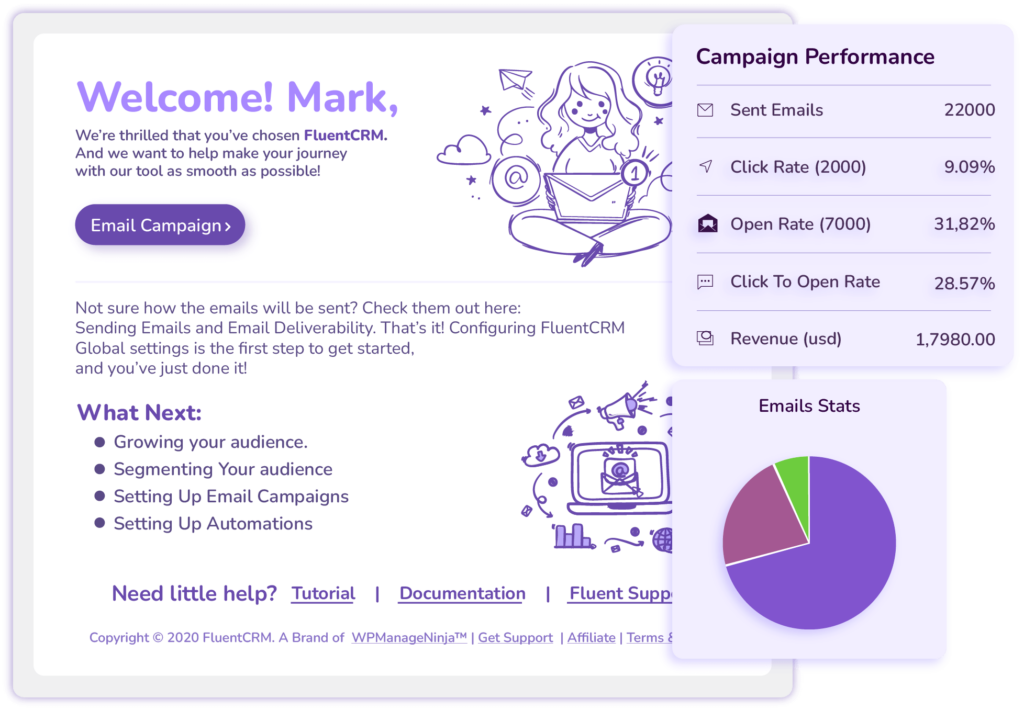
Marketing Automation using WordPress: WordPress Marketing Automation vs. Cloud-based Tools
If you are generating new organic leads every now and then, ensuring personalized user experiences throughout the customer journey becomes a challenge. That’s where marketing automation comes in.
What is marketing automation?
Marketing automation software allows you to automate repetitive tasks so that you can focus on growing your business. They make it easy to obtain the more qualified leads into your business so that you can further nurture them before eventually turning them into sales.
With marketing automation tools, you’ll be able to develop long-lasting customer relationships, boost your customer’s lifetime value, and increase brand advocacy.
Businesses usually automate repetitive tasks such as email marketing, sales, social posting, and many more. That said, you’ll eventually want to jump to marketing automation at some point in your business.
Previously, we have talked about WordPress marketing automation and the best WordPress marketing automation plugins. But why should you do marketing automation using WordPress plugins when there are established marketing automation tools available on the cloud?
Let’s jump right into WordPress marketing automation vs. cloud marketing automation!
WordPress marketing automation vs. cloud marketing automation
WordPress marketing automation came into existence when WordPress developers figured out that plugins could be a solid alternative to the regular cloud-based marketing automation tools. The idea of marketing automation using WordPress is to help marketers do everything without leaving the WordPress dashboard.
However, due to some limitations and assumptions, people do not trust WordPress marketing automation.
So you’ll find a lot of people asking:
- Is marketing automation using WordPress plugins as good as cloud marketing automation?
- Is there any negative impact of using WordPress marketing automation tools on my website?
- What are the advantages of marketing automation using WordPress plugins over cloud marketing automation?
So, in this article, we’ll compare WordPress marketing automation plugins with cloud marketing automation tools to find out whether the assumptions are valid and if there are any real benefits to using WordPress marketing automation plugins.
Ready?
Let’s begin!
Operating platform
Cloud marketing automation tools are usually on the cloud as an application or software. In order to use the application, you need to get into the platform, which usually involves opening another tab on your browser or logging into the platform itself.
When you start marketing automation using WordPress plugins, you can access them right from your WordPress dashboard. Given you have the right permission, once you log into your WordPress dashboard, you can view marketing data and use your plugin without having to switch tabs.
Verdict: Although marketing automation tools are designed to scale your business and save time, cloud-based marketing automation tools unnecessarily shave time off your busy schedule.
Having the ability to operate your marketing tool inside WordPress means there’s less hassle and more time for you. That’s the primary reason people consider marketing automation using WordPress plugins.
Ease of use
Most marketing automation tools allow you to create sophisticated rules for automation via an intuitive interface. Cloud marketing automation tools make it really easy to create workflows and funnels through customer journey builders and funnel builders.
However, it takes some technical expertise to set things up on WordPress. For example, you need additional plugins (add-ons) to connect your WordPress site to a marketing automation tool like MailChimp.
On the other hand, WordPress marketing automation plugins are designed to work within your WordPress site. So it’s unlikely that you’ll need connectors to make them work.
Most marketing automation plugins also develop built-in integrations with other tools your business works with. As a result, you can start automating a lot of things right away! Moreover, WordPress marketing automation plugins ensure a native WordPress feel for the users so that they can operate efficiently.
Verdict: While cloud marketing automation tools have intuitive interfaces, you might need to spend some time getting used to the platform. In comparison, having a more straightforward setup and work process makes marketing automation using WordPress plugins a much better choice than going to the cloud-based tools.
Data management and data ownership
Cloud marketing automation tools usually allow you to host your data on their servers. You can manage your data, but the platform usually owns them. In addition, they are responsible for backing up your data and keeping them secure on their platform for a subscription fee.
Depending on the service, they might allow you to export your contacts and other data. However, if you forget to renew your service, they have full authority to remove or block you from accessing your data.
WordPress marketing automation plugins allow you to self-host data on your hosting server. You own the data, and you can take backups of the data on your hosting server whenever you want!
Even if you stop using the plugin, your data is still stored on your server, and access them anytime!
Verdict: There’s nothing more satisfying than being able to manage and secure the data you own. Hence, if you don’t want to stay worried about losing your data, WordPress marketing automation plugins are a much better choice than cloud-based marketing automation tools.
Service and support
Cloud marketing automation tools are usually hosted and managed by the platform itself. They provide every tool and service you need to get started instantly. For example, a tool like ActiveCampaign comes with CRM software, email, and SMS service. They also provide full support through email, chat, and phone calls.
WordPress marketing automation plugins do provide good support, but there are some responsibilities on the customer’s end in some cases. Some WordPress marketing automation plugins are self-hosted. So customers need to arrange additional services required to get things working.
However, additional services for WordPress marketing automation tools mean customers can pair affordable services like Amazon SES with marketing automation plugins like FluentCRM to save money that they would otherwise spend on expensive cloud marketing automation tools.
Verdict: If you aren’t ready to arrange additional services required for running self-hosted WordPress marketing automation plugins, it’s best to contact the support or choose cloud marketing automation tools.
Impact on website
Again, cloud-based marketing automation usually has no impact on your website’s speed or functionality. They simply allow you to take your data to their platform, where you can automate various tasks depending on your needs.
Although WordPress marketing automation plugins do the same job a cloud-based marketing automation tool would do, they usually stay in the backend of your website. They may use your hosting resources depending on the type of automation you’re trying to achieve.
Verdict: Since cloud-based marketing automation tools do not use any resources your website may need, they do not impact your website at all. So while using a cloud marketing automation tool, you don’t have to worry about your website’s speed or functionality.
On the other hand, WordPress marketing automation tools avoid impacting your website’s functionality or speed by leveraging heavy tasks to additional services. They may use your hosting resources, but as long as you’re using a plugin the right way, you don’t have to worry over the site’s speed of functionality.
Cost
Since cloud-based marketing automation tools come with everything required for the service (e.g., email, SMS, management, backups) and maintenance of the platform, they generally cost a significant monthly subscription fee. The subscription fee may also increase based on how much data it’s storing for you.
On the other hand, you’re on your own when using WordPress marketing automation plugins. If you’re using a fully self-hosted tool, you are also responsible for data management and back-ups. You’ll also need to arrange additional services required to run the tool.
Thus, marketing automation using WordPress plugins doesn’t cost much(or doesn’t cost anything if you’re using a free plugin!).
Verdict: Several examples show that WordPress marketing automation plugins can save you tons of money.
For example, a cloud-based marketing automation tool like MailChimp may cost you over a thousand dollars for ten thousand contacts. With a WordPress email marketing tool like FluentCRM, you can reduce that cost by at least 70% while enjoying a similar service.
Hence, marketing automation using WordPress plugins is undoubtedly cost-effective when compared to cloud-based marketing automation tools.
Final verdict
Cloud marketing automation is generally great for getting started right away. It doesn’t involve any responsibility on the user’s part, doesn’t impact site speed or functionality, and offers excellent support.
However, the major drawback is that they cost a significant amount of money and “growth tax” in some cases.
Marketing automation using WordPress plugins, on the other hand, allows you to own your data and save you a lot of money. Although it may be a bit complicated to set up and configure, that’s a small price considering the benefits you get in the long run.
So that sums up our take on marketing automation using WordPress. If your website is on WordPress, we highly recommend that you consider using WordPress marketing automation plugins instead of expensive cloud-based marketing automation tools.
We tried to cover the necessary considerations when comparing the two kinds of tools, but if you think we missed something, feel free to share them in the comment section!
If you liked the article, follow us on Twitter.









Leave a Reply